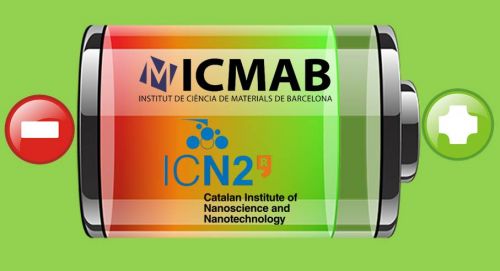
27/07/2018
ICMAB and ICN2 work on the batteries of the future
ICMAB and ICN2 work on the batteries of the future
The challenge to increase the share of green electricity in the energy mix depends on materials science: more efficient photovoltaic cells and more powerful wind turbines to produce more or higher density batteries to store better are some of the challenges that need physics and chemistry to invent and develop the required materials.
In that way, two prospective and promising research results in the field of batteries have been recently published by two top level materials science labs both located in the Universitat Autònoma de Barcelona (UAB) campus, our neighbor and partner: the Institute of Materials Science of Barcelona (ICMAB) and the Catalan Institute of Nanoscience and Nanotechnology (ICN2).
In ICMAB, for the first time, calcium has been electrochemically extracted from a metal oxide in a partially reversible way. According to the researchers, this is a huge step towards the development of rechargeable calcium batteries, a more economical (and with more energy density) alternative than the current most common Li-ion batteries. The study, published in Dalton Transactions, was carried out in collaboration with Toyota Motor Europe, which shares the patent.
In ICN2, researchers that explore conceptual frontiers in the field of electricity storage have developed what they consider a first step and proof of concept of the possible application of electroactive nanofluid electrodes in alternative flow batteries. This work will be released in Electrochimica Acta next August.
ICMAB: http://icmab.es/new-boost-to-future-calcium-batteries
ICN2: https://icn2.cat/en/novel-energy-oriented-materials-group?publications
In that way, two prospective and promising research results in the field of batteries have been recently published by two top level materials science labs both located in the Universitat Autònoma de Barcelona (UAB) campus, our neighbor and partner: the Institute of Materials Science of Barcelona (ICMAB) and the Catalan Institute of Nanoscience and Nanotechnology (ICN2).
In ICMAB, for the first time, calcium has been electrochemically extracted from a metal oxide in a partially reversible way. According to the researchers, this is a huge step towards the development of rechargeable calcium batteries, a more economical (and with more energy density) alternative than the current most common Li-ion batteries. The study, published in Dalton Transactions, was carried out in collaboration with Toyota Motor Europe, which shares the patent.
In ICN2, researchers that explore conceptual frontiers in the field of electricity storage have developed what they consider a first step and proof of concept of the possible application of electroactive nanofluid electrodes in alternative flow batteries. This work will be released in Electrochimica Acta next August.
ICMAB: http://icmab.es/new-boost-to-future-calcium-batteries
ICN2: https://icn2.cat/en/novel-energy-oriented-materials-group?publications
More news
19/06/2014
ALBA synchrotron welcomes the one thousandth researcher
12/06/2014
€ 1.365 billion of foreign investment in the Catalan industry in 2013
03/06/2014
Barcelona Synchroton Park booth at the BioKorea 2014 exhibition in Seoul
27/05/2014
The new Barcelona Synchrotron Park bus shuttle completes its first six months
20/05/2014
SENER opens in the Barcelona Synchrotron Park its new corporate headquarters in Catalonia
15/05/2014
MATGAS, Air Products' leading R&D centre worldwide









